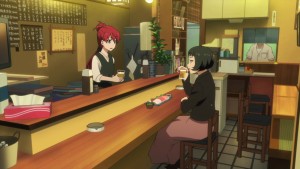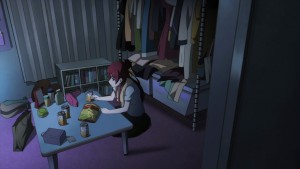
Since its airing, Shirobako gave a good glimpse of the Anime Industry on how it works and the issues surrounding it with some that are interesting to discuss about. Now, I am going to take a look at the last aspect, should you chase your passion or pursue a career that pays well?
Sure, the other four girls (Aoi, Ema, Misa and Midori) had an easier time getting their foot in their door, but there is one girl who had an extremely difficult time and her name is Sakaki Shizuka. The difficulties she faced comes at no surprise considering that the voice acting industry is very competitive and there are only so many roles to go around at a given time. Was it worth it at the end to pursue such a career? Could she have done things differently?

Since the late 2000s, the job market have not been kind towards the millennial generation, which refers to people who have been born from the late 1980s to the early 2000s. The Great Recession affected the economy worldwide and as a result, millennials had a very difficult time trying to find a job out of college in the highly competitive workforce while being strapped with a lot of debt, especially student loans. Also, only a few had an easier time to get a job with a degree in STEM (Science, Technology, Engineering and Math). As a result, most have to work on more than one part-time job, doing various gigs and having to give up ownership on things like cars. As a result, most end up renting and not owning, which can potentially impact one’s ability to build wealth in the future.
Aside from the relatively low pay in anime production, which I focused on, people mostly pursue a job in anime production for the passion, not to get rich. This is understandable because you should try to get a job that you would like since this is where you will spend most of your life doing. However, there is some fields that are difficult to get into compared to others, hence Shizuka’s difficulties.

To me, Shizuka is very relatable since most millennials experience the same things, the inability to land into a role or a job despite having education and/or training. As a result, she has to spend her time working at a part-time job or doing temporary gigs in the hopes of landing in a role some day. When she tries to audition for a role, she ends up getting rejected and usually a more popular voice actor or actress gets the role.
Her situation does not come at any surprise considering how competitive the voice acting industry is in Japan. If you check how many shows and roles at a given season, you will novice that there is only a certain amount of minor roles and of course, only a few major roles. In most cases, a voice director might become reluctant to pick an inexperienced one. This is because he/she might not have enough experience.
In short, this pretty much leaves them the minor roles, which are just as difficult to obtain. This is because many newcomers and already established ones competing for it. As a result, this puts newbies like Shizuka at a huge disadvantage because they cannot gain enough experience while only a lucky few can have a bright career off the bat.
On the other hand, Shizuka’s difficulties do not come at a big surprise. A veteran voice actor, Ohtake Hiroshi shared the challenges in becoming a voice actor a while back. He revealed that only one out of a hundred of young hopefuls who attend a voice acting academy become professionals. Moreover, he stated that it is difficult to keep working as a voice actor without keeping up the effort to get noticed. Lastly, mid-level voice actors tend to have the most difficult time since most companies prefer younger actors and that they lack the reputation compared to high-level ones.
This comes at no surprise since the voice acting industry is a very competitive and many newcomers want to lead their dream of voicing lead characters and becoming popular. The sad reality as mentioned many times is that are only so many roles to go around, meaning that newcomers have to fend for themselves by marketing themselves well while trying to land into minor roles to gain experience. In most cases, most have to take on various gigs or do side jobs in order to put food on the table.

So, what should Shizuka have done to gain experience or exposure considering the experiences Hiroshi shared? Perhaps she could have tried to become an idol singer, which would allow her to gain more exposure and experience since others have done it (Ishihara Kaori and Ogura Yui are some notable real life examples). Also, she could have tried out for live action or stage productions and gain experience too. However, there is a thing called an opportunity cost for every choice, which is the value of the alternatives given the limited resources.
Suppose that Shizuka decided to become an idol singer during high school instead of going to a voice-acting academy after high school. Sure, she would have to spend time practicing the dance routines, singing and participate at events. However, there are some drawbacks in doing so such as having to maintain a certain image along with having to deal with disgruntled fans. While being an idol does not necessarily insure Shizuka a role, she would have a better chance than coming out of a voice-acting academy since she would have more experience and name recognition, which could help her land into a role.
As for me, I was a bit wishy-washy. Although my passion was in computers since my childhood, I decided not to pursue a degree in the field with the fear of not being able to get a job due to these jobs being off shored to other countries. Instead, I pursued Accounting, which I later found out to be too difficult since I have to memorize and understand a lot of rules and apply them. To make a long story short, I ended up changing my major to Management Information Systems and later perusing a Master’s degree in Information Technology, which I finished last year.
Were these degrees worth the loans I have to take out in the end? Mostly yes. While I had a difficult time finding a job due to lack of job experience and the inability to land in an internship, I was able to land in a federal government job in my field that pays well after five months of searching for a job and endless rejection letters. Sure, I have to move, but the opportunity cost of rejecting the offer and searching for a job nearby is high, which is why I decided to take it.
While the economy slowly recovers, it’s clear that people have to make important choices when it comes to decisions like a job, even if it is not something that you wanted to do originally. To me, Shizuka is a very relatable character not because she suffered the most compared to the other girls, but for the fact that her experiences are comparable to what other millennials are facing: a very competitive market, limited amount of good paying jobs and having to work hard in order to get noticed by potential employers, which ends up going to waste.

In the end, Shizuka eventually landed into a minor role in the end that allowed her to get other minor roles. It takes perseverance to get the dream job one wants. Although I felt some despair from reading all these rejection letters, I kept myself positive by doing other things and eventually got a job after the first interview. As they say, you have to keep trying while improving your skills in the meantime.
With that, what are your experiences in trying to get your first job after college? Do you relate to Shizuka difficulties in landing a role?


Maybe I should hire you to post Life Lessons posts at the castle since you clearly knew what you’re talking about while writing this editorial. Good examples used here.
Let us not forget how important testicular fortitude is when chasing a dream career.
Yep, I have been reading too many articles on income inequality and about millennials in general. But still, getting one’s foot in the door is an important step. As they say, everyone have to start off little before one can reach their goal. This is true with all jobs in general and it’s quite obvious that Shizuka will have a harder time due to competition as mentioned before..
So my story is probably on the strange side because I don’t have the same “I’ve always wanted to do X” mentality that most people have. I discovered what I liked mostly with the jobs I took in college. I think most people get too caught up in the romanticized view of it all. Getting your dream job doesn’t all happen at once…you often have to take setbacks and risks in order to make it. I was a volunteer for over two years before I was offered my first paid part-time position in college. Either you’re really well connected or you lay the groundwork early.
I think everyone is different as there are people who don’t know what he/she wants after graduating high school and entering college. There is also a good possibility that one might change his/her major during college or change careers in one point of someone’s life.
I agree that the dream job does not happen at once since it takes time. While there are a few newbie voice actors that get a main role in a popular show, in most cases it’s not the case. As mentioned, networking is important and of course I wasn’t well connected. In short, I couldn’t even get a student job or a internship since I don’t have experience, even during my master’s, but I somehow made it through.
But aside from that, setting the expectations for one’s dream job too high can lead to disappointment in the end.